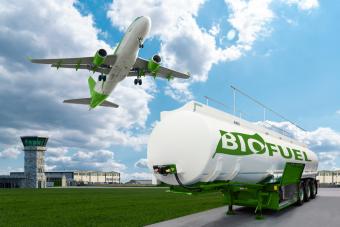
Posted: 24th July 2023 11:33
As the global community intensifies its battle against climate change, one sector of human endeavor has long been considered a stubborn holdout: aviation. Air travel has been an environmental conundrum, primarily because of its significant carbon emissions, contributing approximately 2.5% of total global carbon dioxide (CO2) emissions. The aviation industry has been grappling with this issue, and a promising solution has emerged - Sustainable Aviation Fuel (SAF).
The Need for Sustainable Aviation Fuel
Conventional aviation fuels, derived from crude oil, produce high levels of carbon emissions. The aviation industry is under increasing pressure to curb its environmental impact as the global community pushes towards carbon neutrality. With air traffic anticipated to double in the next two decades, finding an ecologically viable solution for aviation fuel has become an urgent concern. It's here that SAF, which promises substantial reductions in CO2 emissions, holds enormous potential.
What is Sustainable Aviation Fuel?
SAF is an umbrella term for a range of fuels produced from sustainable resources. This can include used cooking oil, agricultural residues, non-palm waste oils, and even municipal waste. SAF is distinct from traditional biofuels in that its feedstocks can be produced without competing with food supply or causing deforestation.
Crucially, SAF is not a single product but a variety of fuels that can be 'dropped in' to existing engines and infrastructure. It's designed to blend with conventional jet fuel, minimizing the need for modification in aircraft engines and fueling infrastructure.
The Benefits of Sustainable Aviation Fuel
One of the key benefits of SAF is its potential to reduce carbon emissions dramatically. This reduction depends on the feedstock used, but lifecycle emissions can be up to 80% lower than conventional jet fuel. Furthermore, the 'circular economy' aspect of SAF – using waste products as feedstocks – means that SAF production can help manage waste, stimulate rural development, and create green jobs. Given the right policy support and market mechanisms, SAF can be a win-win for the environment and economy.
Challenges to Adoption
While SAF's potential is undeniable, its widespread adoption faces significant hurdles. First is the issue of scalability. Currently, SAF represents less than 1% of global jet fuel use due to technical and economic challenges in production. High production costs are a significant barrier. As of now, SAF is two to three times more expensive than conventional jet fuel. To overcome this, investments in technology and infrastructure to scale up SAF production are essential. There's also a need for policy support. Governments need to establish clear policies to incentivize the adoption of SAF, including mandates, subsidies, or carbon pricing.
The Way Forward
Achieving the dream of sustainable air travel will require a multi-pronged approach. Alongside the adoption of SAF, other measures such as increasing the energy efficiency of aircraft and optimizing flight paths can also reduce the industry's carbon footprint. There are positive signs that the aviation industry is taking the challenge seriously. Major airlines are beginning to invest in SAF, and several demonstration flights using 100% SAF have been successfully conducted. Furthermore, key industry bodies, such as the International Civil Aviation Organization, have set ambitious targets for SAF use.
Developments in SAF technology are also promising. Several companies are exploring advanced biofuels, synthetic fuels, and even 'solar fuels' produced from carbon dioxide and sunlight. In the face of climate change, SAF represents a beacon of hope for the aviation industry. While the path to large-scale adoption is fraught with challenges, the potential benefits in terms of reducing carbon emissions and promoting sustainable development make it a cause worth pursuing. With the right mix of innovation, investment, and policy support, sustainable aviation fuel could well be the ticket to carbon-neutral skies.
In the final analysis, SAF represents a fundamental shift in thinking about aviation – from an industry often seen as part of the climate problem to one that can be part of the solution. And in the process, it promises to make the miracle of human flight something that future generations can continue to marvel at, in a world where the skies are not just the limit, but also a symbol of our commitment to sustainable living.



Comments